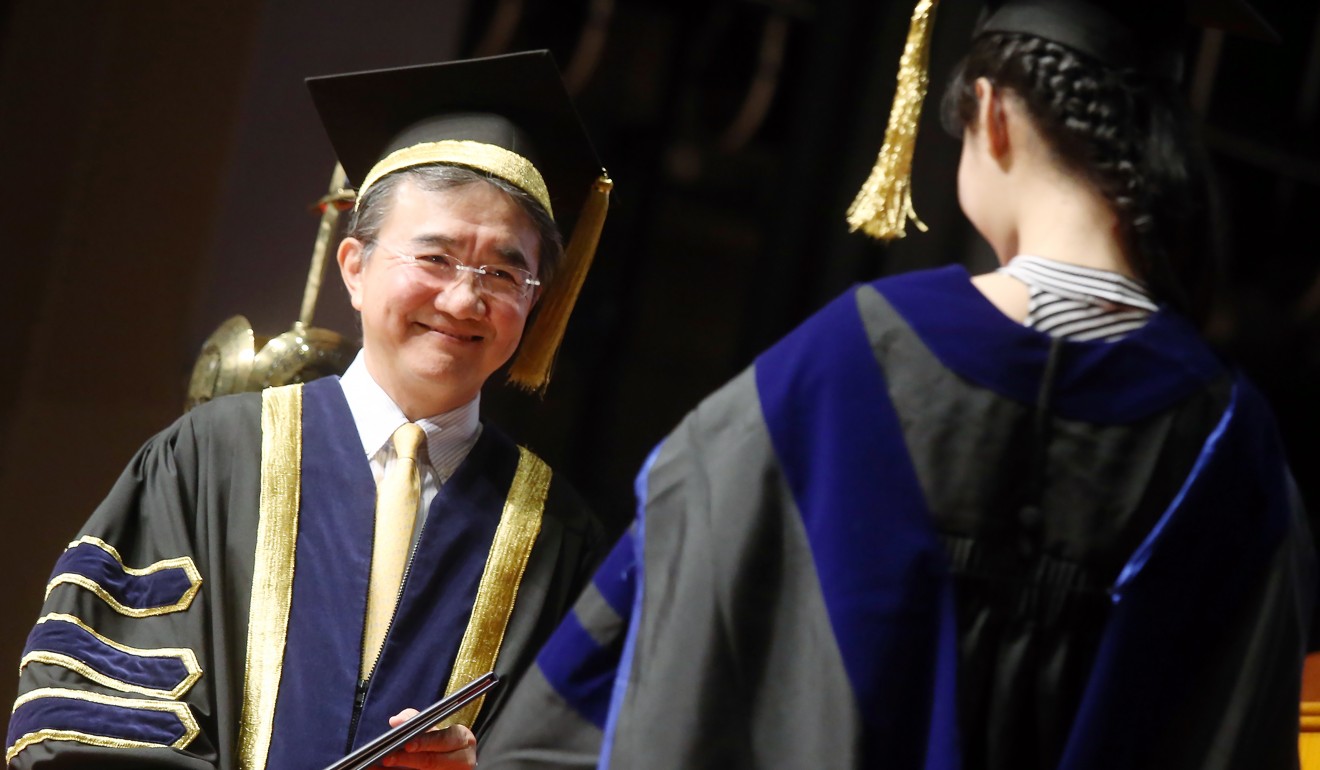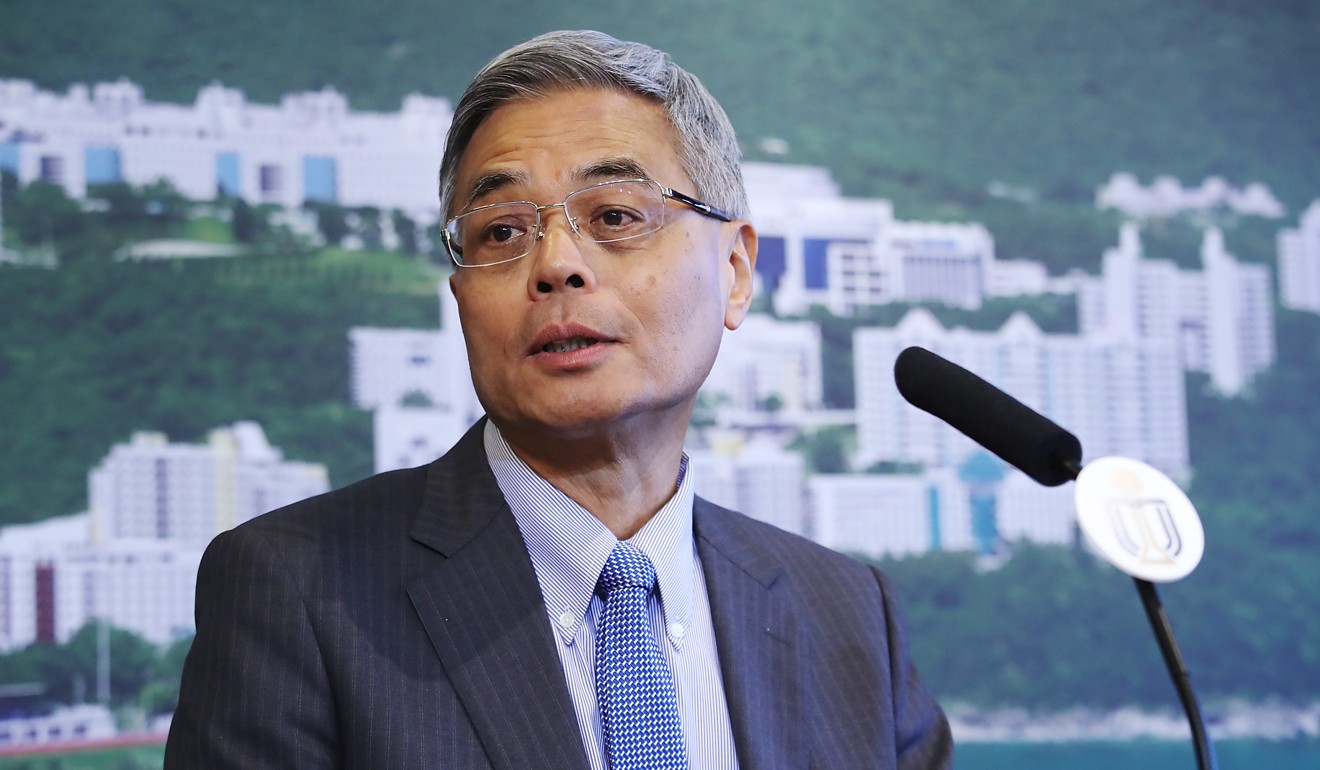
President Rocky Tuan of Chinese University says students facing protest-related criminal charges to get help paying legal fees – but still gets his car covered with slogans
- Rocky Tuan’s remarks fail to impress – students storm out of forum and some cover his car with protest slogans
- Separately, Roland Chin, president of Baptist University, calls for truth commission on extradition bill fiasco
Professor Rocky Tuan Sung-chi, the vice-chancellor of Chinese University, said at a meeting on Thursday that any student facing criminal charges would have their legal fees paid.
Eight Chinese University students were arrested in recent protests against the bill, with four of them charged with rioting.
Cathay pilot and 16-year-old among Hongkongers bailed on riot charges
Separately, Professor Roland Chin Tai-hong, the president of publicly funded Baptist University, sent an email to students, staff and alumni proposing that a truth commission be set up to learn the facts behind the extradition fiasco. He said the commission should be made up of local leaders that Hong Kong people trust.

And Professor Way Kuo, president of City University, met with student representatives on Thursday to discuss the protest crisis, before the university issued a statement urging the government to “respond to social demands”.
During Tuan’s first meeting with students since protests started last month, he was pressed about how he would help students facing rioting charges, an offence punishable by 10 years in prison.
The upcoming lawsuits could cost those students huge legal fees and they could face dismissal from the university.
Asked if the university would cover their legal fees, Tuan said: “We could not use the public expenses in such ways. But I could assure you, we would align those who have offered legal aids. The work is underway.”
He said he would consider prolonging the suspension period for students who ended up in jail and allow them to return to the university upon their release.
“There is an established mechanism the university has to follow,” he said. “But I understand that this is a very special situation and we would study every individual case before making a decision.”

Tuan said he was open to the idea of an independent inquiry into recent clashes between police and protesters, a proposal put forth by other leading academics in the city.
Tuan’s response failed to impress students: dozens left about an hour into the forum, chanting “Reclaim Hong Kong, a revolution of our time.”
Jason Liu, a second-year student in community health, said he walked out because Tuan gave vague answers.
“He kept dodging the questions relating to the five demands,” Liu said, referring to protesters’ main demands from the government, including a full withdrawal of the extradition bill and launching an independent inquiry into the police’s use of force.
After the meeting, students unhappy with Tuan’s remarks covered his car with papers and Post-it notes. Some of the notes said “Your car is now an open platform!” and “Playing with words just like Carrie Lam” – referring to the city’s embattled chief executive.
Tuan had to leave in another car.

Chin, in his email, said the people of Hong Kong must face inconvenient truths about what has happened in recent weeks.
“There are allegations of increased aggression from the protesters. There are allegations of excessive police force. There are allegations of gang collusion. There are allegations of foreign interference. What we see and hear is confusing and conflicting,” he wrote.
He continued: “True stability cannot last if facts are ignored, distorted or suppressed. Without the truth, there is no right and wrong, and thus no justice.”
In a statement released after Thursday’s meeting between senior staff and students, City University condemned all forms of violence and appealed to the government to come up with a solution to the crisis.
It also insisted education should be “free from politics so as to alleviate the escalation of anxiety and avoid the divisive society caused by chaos”.
“The university would like the government to respond to social demands in the best interest of Hong Kong and to ensure student and public safety,” the City University statement said.

On Wednesday, the president of the University of Science and Technology, Wei Shyy, called on the government to set up a commission of inquiry into the political fiasco caused by the controversial bill, which would have allowed the transfer of criminal suspects to the mainland and other jurisdictions where the city does not have an extradition agreement.
Additional reporting by Sum Lok-Kei


